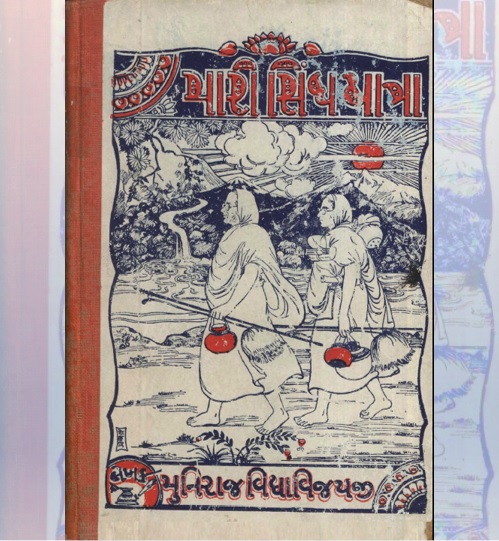
‘Deti-Leti’ custom would be rare to find in any other community in the entire world. It was certainly in the Parsi community, but the custom of Sindhi Hindus is beyond all the limits
[Editor’s Note: This is Part 22 (Sindhi Hindus – Part 3) of a series of articles based on a pre-partition book named “મારી સિંધ યાત્રા” (“منهنجي سنڌ جو سفر”) in Gujarati authored by a scholarly Jain sadhu Shri Vidyavijayji, narrating his experiences of Journey and his Stay in Karachi for about 2 and a half years between 1937 and 1939. It would be advisable to click on the Introductory Article and read it to better understand the series. – Nasir Aijaz, Editor Sindh Courier]
Vimal Shah, Mumbai
The custom of ‘Deti-Leti’
Most educated, forward-thinking, placed on high positions, travelling to Europe and America, experiencing the inventions of the twentieth century – such a modern Sindhi Hindu community is heavily influenced by one custom that is like a stigma on the entire community, and that is the custom of ‘Deti-Leti’.
The kind of ‘Deti-Leti’ custom that Sindhi Hindus follow would be rare to find in any other community in the entire world. It was certainly there in the Parsi community and perhaps would be prevailing even now, but the custom of Sindhi Hindus is beyond all the limits.
The point to be noted is the bride does not have any rights over the thousands of rupees spent by her father in ‘buying out’ the groom
‘Deti-Leti’ is nothing but ‘Sale of Grooms’ in other words. The custom of ‘Sale of Brides’ was earlier prevailing in Marwad and Gujarat – Kathiyawad, but these people’s ‘Sale of Grooms’ custom today is even more. The kind of groom you get depends on what amount the bride’s father spends. When the bride’s father selects an appropriate groom, he must give 10 – 20 – 25 thousand rupees. If the groom is a little better, one bride’s father offers 10 thousand, another 15 thousand, and a third 20 thousand. The rate of the groom keeps inflating like a boom. Her poor father will have to stretch beyond his capacity to find a good alliance for a graduate bride. And even after spending so much, if she does not get a noble and righteous groom it would be her bad luck.
The point to be noted is the bride does not have any rights over the thousands of rupees spent by her father in ‘buying out’ the groom. It belongs to the person who is ‘selling’ the groom. The groom’s father takes the money away and does not give it to the bride.
As a result, in case the husband and wife do not get along well after the marriage, and if the bride is driven out, apart from losing the husband they lose money as well. So, in such cases, the poor wife spends her entire life in pain.
This dire custom of ‘Deti-Leti’ has put a stigma on such a bright, educated, and affluent community. The result of this custom is that you see single girls of 25 – 35 – 35 and in some cases, 40 years in the community, and many remain bachelors their whole life. It hardly needs to be told what the result is of girls becoming very choosy while selecting a groom. What would be the condition of a poor father of two to four daughters without any son? It can be very well understood.
Revolutionary Thinking
As usual, all the people do not think alike regarding a particular matter, likewise their thinking does not remain the same all the time, and that too in today’s rational thinking and revolutionary world, you can’t avoid different views within any community. The orthodox people would try to stick to the traditional views but in today’s liberal thinking world, it is not possible that you don’t find people opposing such dire customs.
Many people are disgusted with this custom. Wise girls are denying their parents the process of ‘buying out’ husbands for them with money. While many boys have started disliking the process of their ‘sale’ for money
The visionaries are clearly seeing the evil results of this custom of Sindhi Hindus. Some people have already realized. It is heard that many thinkers, which includes ladies as well have started seeing this custom with hatred and believe it to be a dire sin in their community. A youth had recited an English poem for me in this regard, that was:
“While the above story is imaginary, it clearly reflects the hatred for the ‘Deti-Leti’ custom.”
Many people are disgusted with this custom. Wise girls are denying their parents the process of ‘buying out’ husbands for them with money. While many boys have started disliking the process of their ‘sale’ for money. Despite that very few people dare to challenge this orthodox custom. Now even the Sindh Legislative Assembly has introduced a bill for the elimination or control of this custom. So, the custom will certainly get eliminated in due course.
Faith and Devotion
One virtue can be seen in the entire Sindhi population and that is their Faith. In our entire journey wherever we travelled we observed inexhaustible faith. The word of ‘Sain’ (Sadhu) is treated like the word of God. Touching the feet of Sadhu and getting their blessings is like the ultimate achievement for them. And they are overwhelmed with respect when they see Sadhus with renunciation of money, worldly matters, celibate, not even touching women, travelling barefoot. We have seen many women crying when we do not allow them to touch our feet and ask.
असीं तव्हांजे चरन छुहणजे लायक न आह्युं?
छा असीं जालु मर्दनख़ाब वधिक पापी आह्युं?
Aseen tavhān̄jē charana chuhaṇajē lāyaka na āhyuṁ?
Chhā aseen jālu mardan khā b vadhika pāpī’āhyun?
Do we not deserve to touch your feet?
Are we, the women, sinners, more than the men?
How would the poor women understand our code of conduct? All the Sadhus and all the lay people in this world are not alike. When we explain them in detail, they become very happy and appreciate the need for such a strict code of conduct. Otherwise, it has become a usual practice amongst Sindhis to ask for blessings for worldly matters like ‘Mahārāja, mukhē asīsa karyō ta māṁ īmtēhāna mē pāsa thī van’yāṁ’, Maharaj, give me blessings that I get the exam passed easily’. Irrespective of all that, the purpose of their faith, devotion and belief is highly appreciable.
Such faith and devotion are not only in common people, but it is the same across all classes like Collectors, Commissioners, Literate, Illiterate, Poor or Affluent. However, highly placed people would also not hesitate to bow down and touch our feet when they meet us on the road or in the middle of hundreds of people. They believe the blessings of Sadhus are auspicious and will help us in our worldly matters as well as in our spiritual progress. But as usual, most people have a worldly wish while only a few would be aiming at spiritual progress. But after all, they have very much faith and devotion. (Continues – Read Part 23 of series on Sunday July 23, 2023)
Click here for Part-I, Part-II, Part-III, Part-IV, Part-V , Part-VI , Part-VII , Part-VIII , Part-IX, Part-X, Part-XI, Part-XII, Part-XIII , Part-XIV, Part-XV, Part-XVI , Part-XVII, Part-XVIII , Part-XIX, Part-XX, Part-XXI
_______________
About the contributor of the series of Articles based on the book
 Vimal Shah is a follower of Jainism by birth and is based in Mumbai, India. He is a Computer Engineer and holds a Diploma in Jainology from Mumbai University. He has an immense interest in reading, writing, studying, and teaching Jain Philosophical subjects. He conducts classroom as well as online sessions on Jain Philosophical courses. He continues to study various subjects and remains a student of Jain Philosophy. He has significantly contributed to the Translation Project of the ‘Compendium of Jainism’ from English to Gujarati – an initiative of the JAINA India Foundation. He is also associated with a Project for the translation of Jain Aagams (Scriptures) from Gujarati to English. He has a special interest in the history and preservation of the Jain Heritage in Pakistan. He was part of a Delegation of the Jain Heritage Foundation, New Delhi that visited various Jain Heritage Sites in Pakistan in May-2023.
Vimal Shah is a follower of Jainism by birth and is based in Mumbai, India. He is a Computer Engineer and holds a Diploma in Jainology from Mumbai University. He has an immense interest in reading, writing, studying, and teaching Jain Philosophical subjects. He conducts classroom as well as online sessions on Jain Philosophical courses. He continues to study various subjects and remains a student of Jain Philosophy. He has significantly contributed to the Translation Project of the ‘Compendium of Jainism’ from English to Gujarati – an initiative of the JAINA India Foundation. He is also associated with a Project for the translation of Jain Aagams (Scriptures) from Gujarati to English. He has a special interest in the history and preservation of the Jain Heritage in Pakistan. He was part of a Delegation of the Jain Heritage Foundation, New Delhi that visited various Jain Heritage Sites in Pakistan in May-2023.